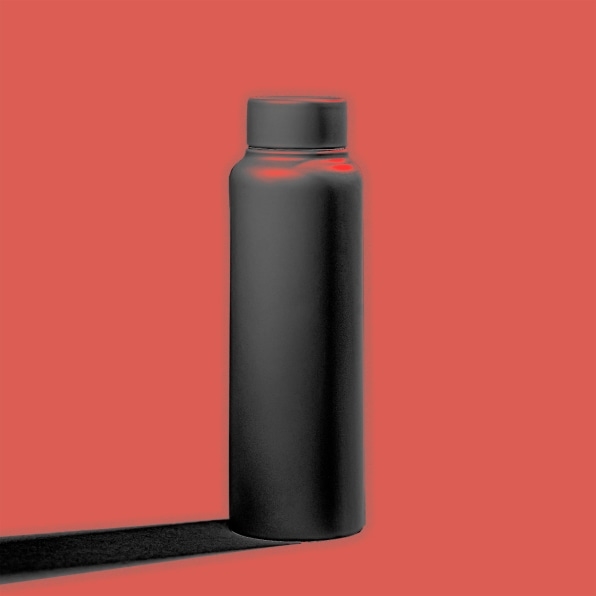After a two-year hiatus, conferences are starting back up. Many of us are excited to put on our best work outfits and gather with colleagues in person. But is anybody looking forward to a return of the cheap swag–the ugly water bottles, flimsy pens, ill-fitting t-shirts–we used to lug home in pre-pandemic times?
For decades, companies have taken advantage of live events to hand out promotional products. Sometimes, they use swag to attract new customers or to entice prospective employees; they might gift branded goods to employees or clients to cultivate loyalty. All of this has given birth to a global industry that pumps out a whopping $64 billion in swag, sold by suppliers like 4imprint and Crestline, which will take a brand’s logo and slap it on almost anything.
Brands generally try to reach as many people as possible within a fixed budget, so most swag-makers sell low-priced, low-quality items in bulk. There’s mounting evidence that most of these goods quickly end up in the trash. But you don’t need data to know this: How many times have you chucked out a free calendar or flash drive a company shoved at you?
There’s been growing concern about the fragile state of our planet, from climate change to the plastic pollution crisis. And while swag is cheap, it exacts an enormous toll on our planet. As I reported in a 2018 article, manufacturing these goods requires extracting raw materials and spewing warming greenhouse gases into the atmosphere. And since most of these items cannot be recycled, they will ultimately be incinerated or clog up landfills. All so that a brand can fleetingly flash its logo at you.
It doesn’t have to be like this. The pandemic was a reset button, prompting society to reevaluate many aspects of life, from shopping habits to whether offices are really necessary. COVID-19 caused the swag industry to scale back as events were cancelled, but this fall, they’re coming back with a vengeance. Brands, manufacturers, and consumers now have an opportunity to rethink whether we want these cheap, planet-destroying items in our lives.
Change might be around the corner. Since I wrote my previous story, a wave of businesses has popped up, offering more sustainable alternatives to swag that help brands achieve the same objectives.

The data is in: We don’t want swag
It has always been hard for brands to figure out whether swag is really helping spread awareness. It’s impossible to know whether handing out a stress ball imprinted with a logo will stand out in the recipient’s mind, especially when they already have a bag full of similar products. “Giving out swag has become an industry norm,” says Chad Hickey, founder and CEO of Givsly, a four-year-old startup that helps organizations gain brand awareness through charitable giving, rather than swag. “If a competing company is giving out swag, they feel the need to do the same, even if it’s not clear what the return on investment might be.”
But millennials and Gen Z say sustainability is one of their top concerns and cheap, disposable products are anything but eco-friendly. In recent years, young people have spoken out about fast fashion’s calamitous impact on the environment. Swag has a lot in common with fast fashion, but since consumers aren’t buying it themselves, it’s hard for them to signal that they don’t want it.
Givsly has come up with clever ways to show that people are ready to ditch promotional products. The startup’s business model revolves around persuading companies to spend part of their marketing budget on donations. The idea is to give recipients an opportunity to give money to a cause instead of receiving a material item. At first, companies were hesitant to do this, for fear that recipients wouldn’t find a donation compelling or memorable, so Hickey encouraged companies to give them a choice between the two. Givsly tracked the outcome and found that between 40% and 60% of people chose the donation over the swag item.
To further make the point, Givsly placed large bins in offices around the country, asking employees to throw out unused, unwanted swag, so it could be passed on to people at homeless shelters. They quickly filled up, and Givsly collected 42 enormous containers full of water bottles, notebooks, and T-shirts. “Companies spent money making these products, and these bins show that they were as good as throwing money away,” says Hickey.

Skipping swag altogether
Givsley has now convinced Fox, Yelp, and Waze, among dozens of other companies, to use its platform. Hickey says that for these donations to effectively replace swag, they need to help the brands achieve their objectives, which are varied. In some cases, they brought swag to job fairs to encourage potential employees to apply for positions or to get prospective clients to sign up for a mailing list. In others, they simply wanted to use gifts to give consumers or employees a positive feeling about the brand.
Givsly has used technology to meet these goals. To opt for the donation and pick the charity they would like to give to, people scan a QR code where they input their email address, allowing the company to follow up with them. If they want, people can also share why they chose that particular charity. Givsly has found that some people take advantage of this comment box to express how grateful they are that the company enabled them to give to a cause they feel strongly about, like fighting climate change. “Many people wish they could donate more to charities, but don’t have the resources to do so,” says Hickey. “This approach allows them to support causes on someone else’s dime.”

If you must, gift fewer, better swag
Simon Polet, who founded a sustainable swag company called Merchery, says that there are some companies that are very resistant to giving up promotional products because they believe it actually has an impact on customer or employee engagement. And indeed, based on Givsly’s data, 40% to 60% of people would, indeed prefer a material object to something more ephemeral, like a donation. In 2018, Polet decided to launch a company that would address some of the problems in the sway industry, and sell products that are more sustainable and ethically source than traditional promotional goods.
Merchery sells things like Yeti tumblers, Patagonia and Arc’Teryx jackets, and Pela compostable phone cases, all of which can be emblazoned with a brand’s logo. These products are significantly more expensive than other promotional product companies. Its water bottles range in price from $6.24 for a plastic one to a $94.71 self-cleaning one from Larq. Meanwhile, other swag brands like 4Imprint typically charge less than a dollar per bottle.
But Polet makes the case that recipients judge brands based on the products they hand out, so it makes sense to invest in items that are good quality and well designed. And given that brands have limited budgets, he argues that brands that want to give things away should be more strategic about whom they target. “A big part of the problem is that companies are just throwing products at lots of people, hoping it will have some impact, and expecting many people to throw them out,” he says. “We think it makes more sense to have a list of clients or potential talent that really matter and give them really nice things.”
Polet also believes that the fundamental problem with swag is that the end consumer doesn’t actually choose the product, which is why products they receive so often go to waste. Merchery has launched a platform that allows companies to create a simple website where people can choose from a couple of gift options to find one that they want. This works particularly well for things like holiday gifts for clients or employees. “Even if a company creates a beautiful Yeti water bottle or Patagonia jacket, the employee may not want that item,” Polet says. “So, why not give them the choice, so they can get something they will actually use for a long time? In the end, coming back to a product over and over is the way to really cultivate loyalty.”
Still, Polet realizes that the most sustainable alternative is no product at all. And ultimately, that might be the best solution. “I’m fully aware that promotional products are driving the planet to the brink of disaster,” Polet says. “I’m all for the industry shrinking, even if that affects us.” Meanwhile, Merchery is looking into allowing companies to add branded experiences to their portfolio of options. That’s a surefire way to be truly zero-waste.
(27)